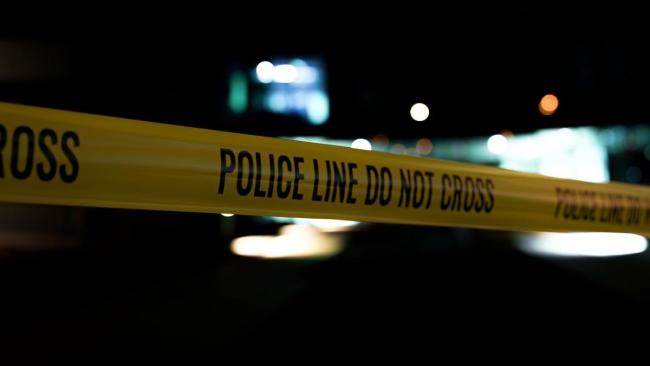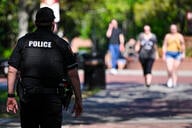You have /5 articles left.
Sign up for a free account or log in.

Parents are concerned about violent crime in neighborhoods near Temple University.
Stock Depot/iStock/Getty Images Plus
Concerned by violent crime in neighborhoods adjacent to Temple University, parents of students who live off campus have taken matters into their own hands, hiring private security to patrol the area.
Violent crime rates are ticking up nationally, including in Philadelphia. The November murder of Temple student Samuel Collington—shot outside his apartment mere blocks from campus during an attempted robbery—prompted some parents to contract a private security force to patrol the part of the city that many students call home, an area where crime is rampant.
A cursory glance at the Temple University Police Association Facebook page shows why parents are concerned. Alerts of shootings, robberies and other violent crimes pop up with alarming frequency, often accompanied by comments from parents voicing their concerns.
For Jen Hedberg, complaining online offered no peace of mind, so she took action instead.
Private Security Patrols
Hedberg, who lives in Massachusetts, said safety wasn’t a top concern when her son headed off to Temple four years ago. Instead, she was worried that he might dislike Temple and drop out. But as her son nears graduation in May, Hedberg’s fears for his safety have grown, especially since he moved into a neighborhood near campus during his senior year.
“I’ve always kind of had some concerns,” Hedberg said. “But once Sam Collington was shot, that really heightened my concern. I expected a robust response from Temple in upping its patrol but never really saw that happen. And then, one day, my son called me and told me there was an armed robbery right outside of his house. While we were on the phone, the police were showing up and people were being arrested. And it was 5 p.m.—it was daylight.”
Initially, Hedberg wanted her son to move, but it proved challenging to do in the middle of the semester. It also would have required breaking his lease and taking on additional rent. So Hedberg came up with another idea: hire private security to patrol the area.
Hedberg looked into the idea, solicited quotes from various security firms and then raised the issue on a private Facebook page for Temple parents. Other parents weighed in, noting similar safety concerns; soon they established a perimeter for a private patrol service. Now a marked car patrols an area near campus six nights a week. And while private security guards don’t have the authority to make arrests, they can intervene and contact local and university law enforcement.
What started out as one mother’s effort to keep her son safe soon turned into an impromptu crowdfunding project with other parents donating money to cover the roughly $30-an-hour patrol costs. One donated $2,000, another $1,000 and some have kicked in small amounts like $25.
Hedberg said other parents may keep the private patrols going after her son graduates. But for now, having private security gives her—and other parents—a little peace of mind.
Temple’s Public Safety Efforts
Temple officials note that the university has a series of initiatives underway not only to protect students but also to leverage faculty experts to address violence in greater Philadelphia.
“The university’s approach to solving violence in the region is a holistic one and it will continue to invest in, and support, programs that create educational opportunities, economic development and research regarding substance use disorders, trauma and violence reduction,” Stephen Orbanek, director of communications at Temple, told Inside Higher Ed via email.
Such efforts include an audit of campus safety services by former Philadelphia police commissioner Charles Ramsey; a recently launched Task Force on Violence Reduction, comprised of faculty, staff, students, parents and community members; and the deployment of the new RAVE Temple Guardian personal safety app—which allows students to contact campus police and offers “virtual” safe walks, among other features—as well as other efforts to address public safety.
“Gun violence is a complex issue and one that won’t be solved overnight,” Orbanek said. “We’re eager to hear the recommendations of the [Task Force on Violence Reduction] and are confident that their collective wisdom will benefit our university, our community and our city.”
Temple also released the results of a recent campus safety survey, which found that students largely feel safe living on campus but less so in private housing on or near the campus. While 81 percent of students feel safe living in residence halls, that number falls to 56 percent for those off campus. According to Temple’s Common Data Set, 84 percent of undergraduates live off campus.
Finding a Solution
Daniel R. Pascale, executive vice president of Margolis Healy, a national safety and security consulting firm that works with colleges and universities, said that the situation at Temple is unique. Though he isn’t familiar with the particulars at Temple, Pascale said he’s unaware of another campus where a parent has taken the initiative to contract private security to conduct such patrols.
“I do know of some groups—off-campus neighborhood initiatives, independent business districts—that will at times hire off-duty officers for private contract security to patrol neighborhoods, but certainly nothing down to the level of an individual parent,” Pascale said.
Pascale added that violent crime has been climbing in the last year, especially in major cities.
“Certainly, we have seen crime and violent crime on the uptick over the past 12 months,” Pascale said. “So these are serious considerations that I know our counterparts in higher education and the many clients that we work with are certainly addressing, and they are well aware of it.”
Ultimately, he urges concerned parents and universities to come together to address these issues. But at Temple, Hedberg—who noted that she has not reached out to the administration—feels that there is a disconnect. Parents aren’t listened to, she said, and the university leadership doesn’t act with a sense of urgency.
Hedberg suggested that the university has not been willing to work with and has had no contact with JNS Protection Services, the private firm she and others contracted to patrol nearby neighborhoods. Orbanek disputes that account, saying JNS contacted Temple on Feb. 21 and “provided details of their assignment” and that Temple Police officers have offered their support. Orbanek said that campus police “have since connected with private security officers a few times” while on patrol.
Though Hedberg hasn’t reached out to Temple’s leadership—she feels a meeting wouldn’t result in any changes—she knows what she would say if she could have a conversation with administrators.
“You have to open your mind to new ideas, like hiring private patrol. You have to stop worrying about how things look, what the optics are,” Hedberg said. “That’s what I would say to the president.”




